TABLE OF CONTENTS
- Introduction
- Mission Briefing
- The Target
- The Recon
- The Assets
- Operation Honeypot
- Debrief
This article was written under Crusader Kings 3 Game Version: Peacock (1.11.5)
Please note that much of the information in this article is based on anecdotal evidence and a lot of trial and error. I have not had the opportunity to delve into the actual source code, but I am happy to make any corrections if more accurate information is discovered. If you have any comments, you can either post here or e-mail me at: [email protected]
1. INTRODUCTION

Image Attribution: "Espionage" by gregt99 is licensed under CC BY-NC-ND 2.0. To view a copy of this license, visit https://creativecommons.org/licenses/by-nc-nd/2.0/?ref=openverse.
Hostile schemes can be extremely powerful in Crusader Kings 3. Murder tends to be the most common hostile scheme but Abduct can also be useful if used strategically. Claim Throne may have the biggest impact but you'd probably use it only once and only if you are playing as a vassal. Fabricate Hook, Steal Artifact, and Overthrow Regent round out the list - these have smaller stakes but offer effects that are not easily replicated.
The main challenge to successfully completing hostile schemes is the lack of potential agents willing to help. It is not uncommon for there to be few or even no one willing to join your scheme. This could be the case if this is a foreign court of a different religion and culture where everyone dislikes you. Or it could be that everyone likes their liege or likes the target of the scheme. Or they could be fearful and intimidated by their liege or the target.
Lucky for you, I do have a special patented technique for getting agents for most hostile schemes - I like to call it the "Honeypot" strategy. It involves inserting agents into another court through marriage. In this guide I will explain how the strategy works and then present a walkthrough on how to do it.
2. MISSION BRIEFING
If there aren't sufficient agents in another court to support your scheme, what you can do is to send your own agents to that court to help you with your scheme. Now you can't just tell a courtier to show up at another court - things don't work that way. But what you can do is find an agent with high intrigue who is sympathetic towards you but hostile towards the target, invite them to your court, and then marry them into the other court (hence the "Honeypot" name). And once they arrive at the other court they can then facilitate your hostile scheme.
This is a tried and true method that I used to use a lot back in Crusader Kings 2. It works just as well if not better in Crusader Kings 3 because in CK3 most courts have more random unmarried courtiers due to knights and court positions.
Generally, other rulers care a lot about marriage prospects for their family and dynasty, but have very low standards for unrelated courtiers. So you will mainly be suggesting marriages for their courtiers and not their relatives or dynasty members. Also there is a -120 penalty for suggesting a lowborn prospect to a target that is not lowborn. If your asset is lowborn, it's best to match them with a lowborn prospect. If your asset is not lowborn, you can match them with a lowborn or highborn prospect. In order to accept a marriage proposal for random courtiers, the other ruler doesn't need to love you, but they have to not completely hate you and it has to be a reasonable match (which rules out older women due to "age considerations" and/or "low fertility"). Since most courts tend to have mostly unmarried male courtiers, most of your assets will be female and should be relatively young (i.e. below the age of 40 as a rough benchmark).
The other court does need to have unmarried courtiers that you can propose marriages to. Since your assets need to end up in their court, female assets should be married normally (patrilineally) while male assets need to be married matrilineally. You should also marry adults with adults. Betrothals involving young children may take too long and the agent won't move to the other court until the marriage occurs.
The Honeypot strategy can work in courts in your realm (your vassals or their vassals) or in foreign courts. It can work in courts of a very different culture as well. But it is dependent on the other liege accepting a marriage proposal so some degree of interfaith marriage needs to be possible. For whatever reason, the "different faith" penalty for marriage acceptance is based on the faith of you (the proposer) and the liege. It doesn't matter what the faith of the two prospects are. So if you are an Orthodox ruler proposing that your Ash'ari courtier marry an Ash'ari courtier in an Ash'ari ruler's court, you will get a -1000 penalty.
Essentially you can do this with faiths that view you as Astray or Hostile but not Evil. For example, as a Christian (with Ecumenism) ruler you can arrange marriages in the courts of rulers who view you as Astray:
- Other Christian faiths with Ecumenism (Catholicism, Orthodox, Apostolic, Coptic, Mozarabism, Insularism, Krstjani, etc.).
What matters is how the other faith views your faith, not how your faith views them. Thus Christians and Muslims can do this in a Buddhist court, but Buddhists cannot do this in a Christian or Muslim court. For Christian religions, the following religions and faith view you as Hostile:
If your Christian faith has Ecumenism, then other Christian faiths without Ecumenism (Nestorianism, Bogomilism, Catharism, Iconoclasm, Messalianism, etc.).
If your Christian faith does not have Ecumenism, then all other Christian faiths view you as Hostile (regardless of whether or not they have Ecumenism).
Eastern religions (Buddhism, Hinduism, Jainism, Zoroastrianism, Taoism).
Faiths with Christian Syncretism (Mandeaism, Priscillianism, Euskal Erlijioa).
But you cannot do it with faiths that view you as Evil:
Islamic faiths
Judaic faiths
Dualist faiths
Miletê Tawûsê Melek faiths
Pagan religions
The Iberian Struggle has special rules for Involved characters that allow interfaith marriages in Iberia. If the Iberian Struggle ends through Detente, then interfaith marriages are permanently enabled between Involved cultures.
In the past, I recall the honeypotting method worked with guests (who determine their own marriage rather than their host deciding, which can be a workaround if the host has an incompatible faith) but in Version 1.11 Peacock it seems that arranging a marriage with a guest causes the guest to come to your court regardless of the marriage type. I think it was different in Version 1.6 Castle because I remember needing to be careful about marriage type to get inspired guests to come to my court through marriage. In any case, right now honeypotting requires the marriage to be a courtier and not a guest.
3. THE TARGET


"Omaid Saffarid, you have committed an egregious crime against the Byzantine Empire and the fabled Kitty Dynasty. Ever since the days of antiquity, stretching back to the Second Era of the Crusader Kings, the Kitty Dynasty has led the East Roman (Byzantine) Empire to victory and prosperity. As every citizen of the empire knows, by imperial decree, when marrying outside the dynasty, every male Kitty must marry patrilineally while every female Kitty must marry matrilineally.
With shining intelligence and robust health, Nonna Kitty is a model of good Kitty breeding. Her first marriage, with Zacharias Idrisid, was personally arranged by Emperor Leon Kitty of the Makedon line himself! Nonna performed her familial duties by birthing two healthy children - a daughter and a son, thus advancing Emperor Leon Kitty's project of incorporating the Sayyid trait into the Kitty dynasty.
However, with Zacharias' untimely death, the treacherous Saffarids took advantage of this tragedy and violated imperial law by marrying a female Kitty patrilineally! Such flagrant disregard for our cherished traditions threaten the sound foundation of our civilization and our people. As a result, in accordance with imperial law, Omaid Saffarid is thereby sentenced to death.
Your selfish actions have brought upon your own doom. Your selfishness has also denied your son the blessed opportunity of growing up as a Kitty. The one small mercy that can be offered is that since your Saffarid son is not in line to inherit any lands or titles that rightfully belong to the Kitty dynasty, your dishonor ends with you and your son's life will be spared. Perhaps, if he proves himself worthy, he will be allowed to marry matrilineally back into the Kitty dynasty."
A few times every game year I check to see if any adult dynasty members are single and need new spouses. But sometimes they get married off (incorrectly) before I can set up new marriages for them.
Every few game years, I do an audit to make sure all the male Kitties are married patrilineally and all the female Kitties of child bearing age are married matrilineally. During this latest audit I found 3 violations - all female dynasty members married patrilineally after their first husband died. In one case I was able to invite the new husband to my court and make him take vows. In the 2 other cases, I couldn't invite the new husband and so I had to resort to murder/execution. Yes, technically there is a divorce option but I am not going to spend precious Renown when a little intrigue can provide an alternate solution....
4. THE RECON
The target resides in the county of Tun, which is held by my vassal who is of a different faith (Arewordi) which views me as Hostile. Thus marriage proposals are possible.
Now there aren't very many agents readily willing to help out. There are two minor players pitching in, but right now the scheme is only at 58% success chance and 73% secrecy. There are a few potential agents I could bribe, but it's a little pricey and I could find my own agents with higher intrigue.




If I scope out the court in Tun, I find that there are 21 courtiers, of who 10 are unmarried and all of them happen to be male:
- 1 Spymaster / Court Physician / Aswar (Knight)
- 1 Court Tutor / Aswar
- 1 Caravan Master
- 2 Aswar
- 4 other courtiers



So that means I will be relying on female assets, which is the typical scenario. I can max out my success chance with just two good agents, but theoretically I could insert up to ten agents if I wanted to.
5. THE ASSETS
To recruit assets, you need to first invite them to your court so you can then marry them off.
It helps to have a royal court and to max out your Lodgings to get the highest possible bonus to court invites.
You then want to increase the opinion of potential assets so that they are willing to come to your court and possibly even for free. You can set your spouse to assist in Court Politics. You can equip artifacts that increase Diplomacy, General Opinion, Courtier Opinion, and possibly Attraction Opinion. The Open-Minded and Apostate perks go a long way towards opening up options for who you can recruit. And finally, it helps to have more Diplomatic Range across the world since that gives you access to more potential courtiers to choose from.

There are many factors to consider when deciding which assets to recruit for the job:
Since you are trying to succeed with your hostile scheme, high Intrigue is the most important thing to look for in an agent.
Due to how fertility works in CK3, male assets can be any age (though they should be adults so they can immediately marry and help with your scheme) but female assets should be younger. Younger than 40 (but at least 16) is a rough guideline - the younger the female asset is, the more likely the marriage proposal will be accepted.
Highborn assets can be married off to highborn or lowborn courtiers in the other court. Lowborn assets can typically be married off to lowborn courtiers but it is much harder to marry your lowborn asset to a highborn courtier in another court.
In order to help you with your scheme, you generally want the asset to dislike the liege and/or dislike the target (especially with a murder scheme). The easiest thing to do is to find a Zealous courtier of a different faith who will likely hate everyone in the other court. The Zealous courtier doesn't even have to be of your faith, they just have to tolerate you and hate everyone else. You can also look at the personality traits of the murder target. Choose opposite traits if there is an opposite trait opinion penalty and avoid the same trait if there is a same trait opinion bonus. Remember that Ambitious hates Ambitious. Last of all, if the target is Beautiful, Handsome, or Herculean and has a high attraction opinion, you can choose an asset who is homosexual or asexual and thus is not attracted to the target.
Some traits like Forgiving, Honest, Just, and Compassionate are less willing to approve of these unconventional methods. The same can be said about particular personality types with high Compassion (Compassionate / Gracious, Altruist / Empath) or Honor (Honorable / Righteous, Gentleman / Gentlewoman / Paragon). By filtering primarily for Intrigue, you tend to indirectly filter out those traits since they provide Intrigue penalties. And by prioritizing Intrigue, the top candidates tend to be have traits like Deceitful, Arbitrary, Paranoid, Callous, Sadistic, etc.

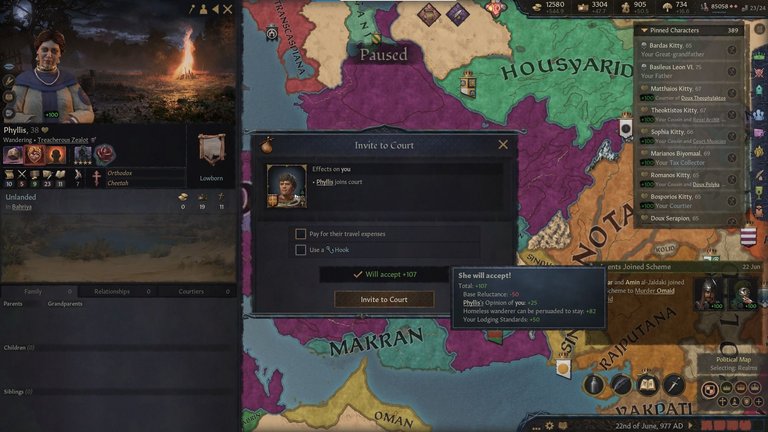


Ideally you will be able to recruit agents for free (such as above).
In the early game, you might need to send gifts of gold to convince the courtiers to come to your court. However, even if you do have to send gold, it can still be worth it.
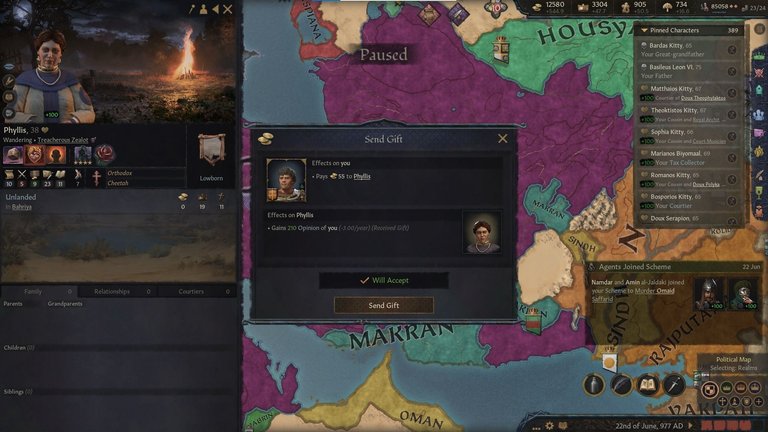
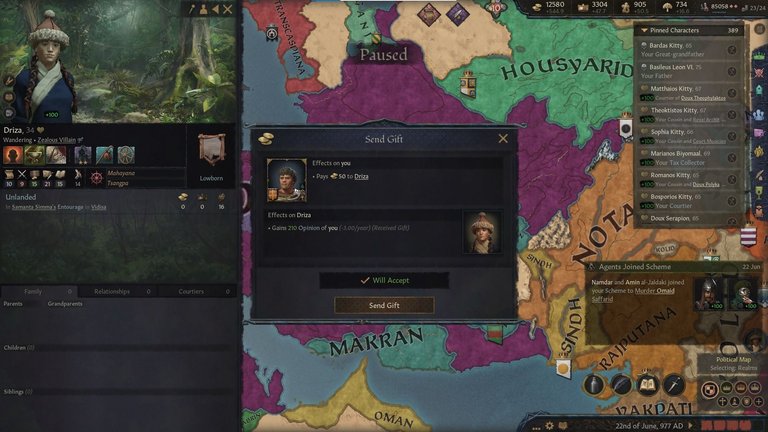
If you compare this to the cost of bribing existing court members in The Recon section, it is still cheaper to recruit your own agents and they contribute more success and power to the scheme.
6. OPERATION HONEYPOT
Once you have recruited the assets to your court, just arrange marriages to send them to the other court. After the other ruler agrees, invite the assets to join your scheme. If you did things well, they should be willing to accept.
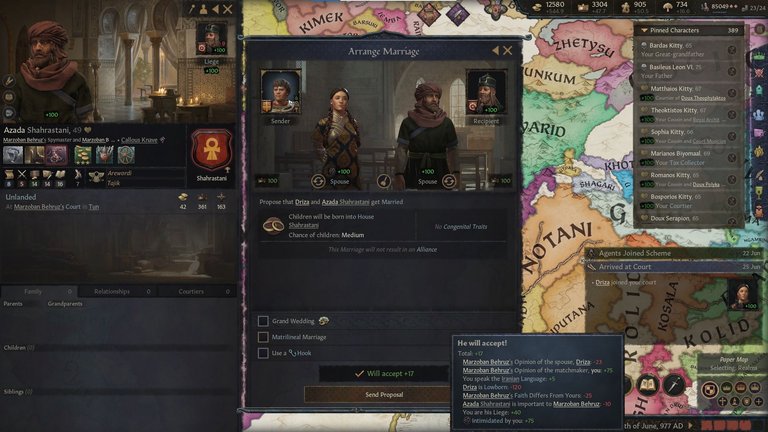

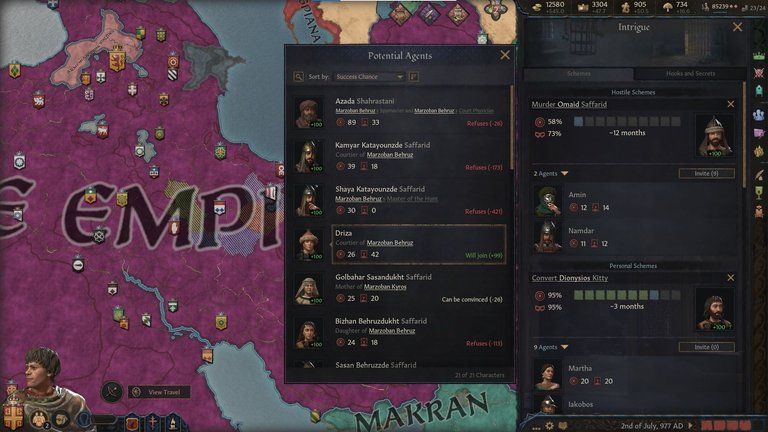
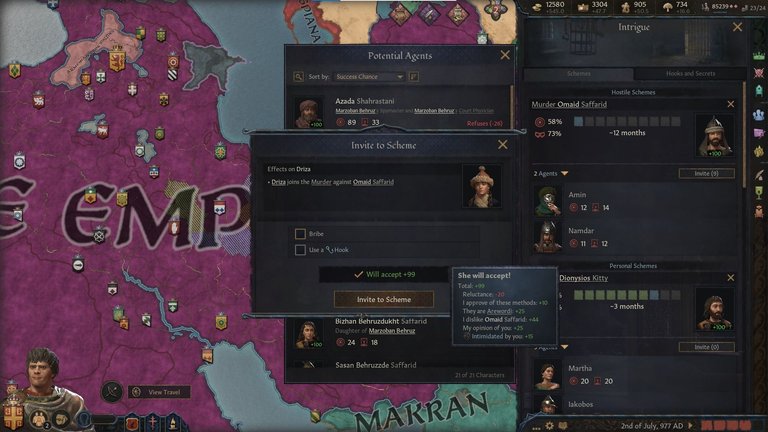
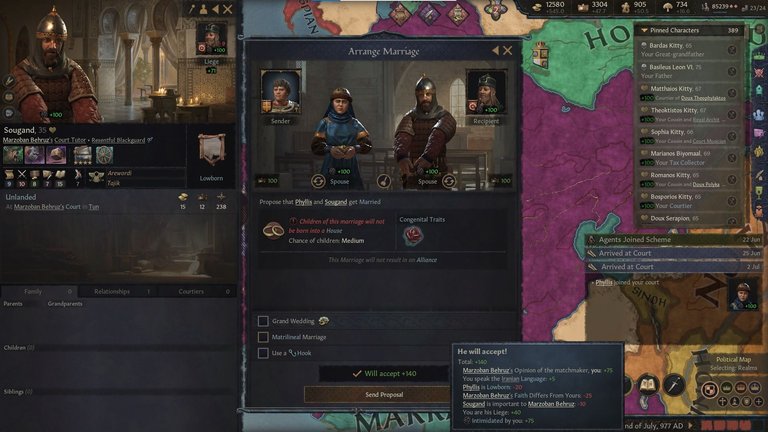
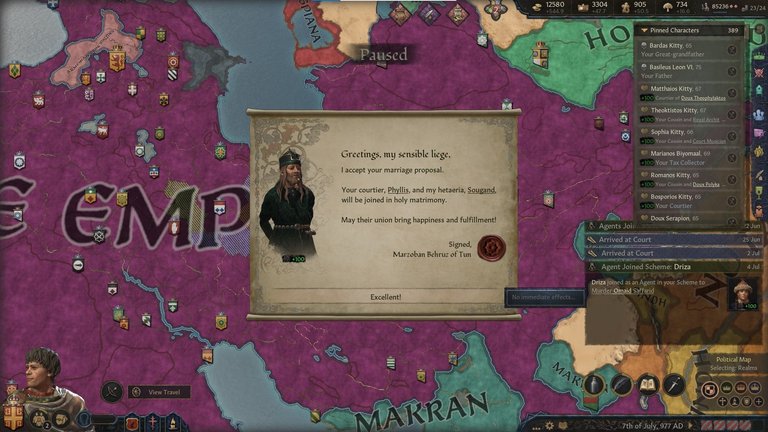
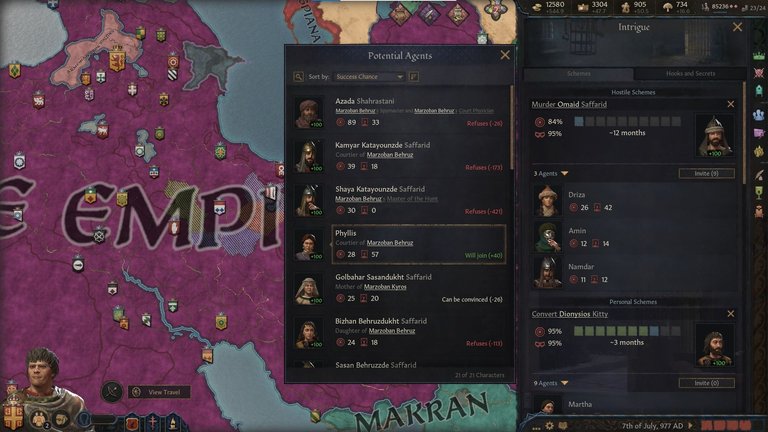
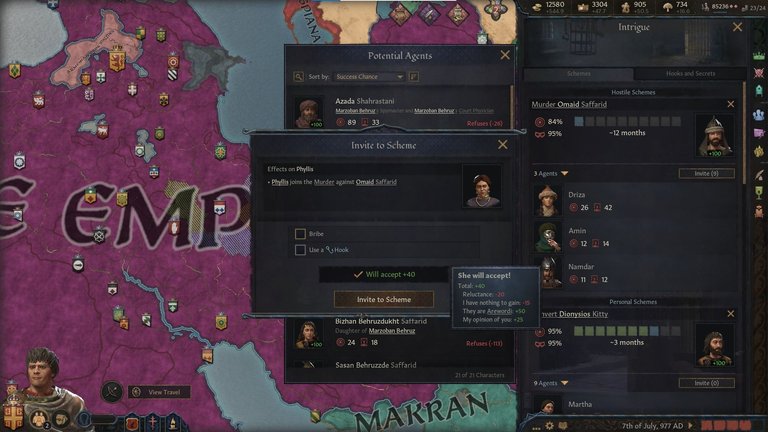
There is a longstanding bug that sometimes an agent can contribute twice to the same scheme. This typically happens when the agent is already willing to join the scheme (hence there must be an internal trigger for them to automatically join) but then you also manually invite them to join the scheme. This results in them joining twice (once by manual invitation and once automatically). I remember this bug existing in Version 1.6 "Castle" and it still persists through Version 1.11 "Peacock."
Once the second agent joined, I had enough to max out success chance and scheme power. Plus I could have also sent another eight agents in if needed, so the duplication bug didn't make a difference.
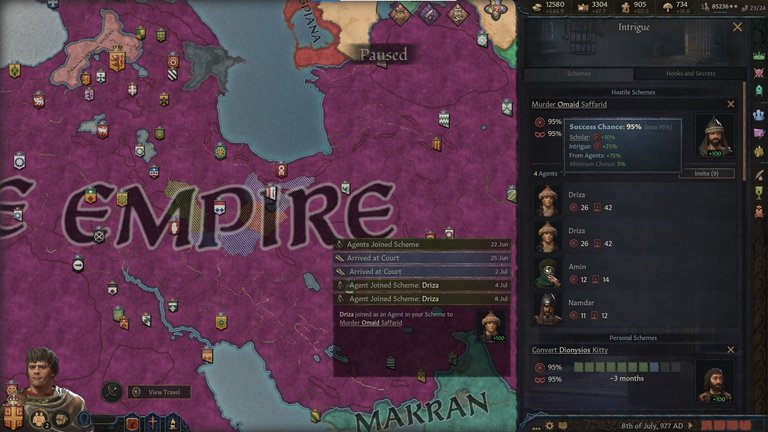
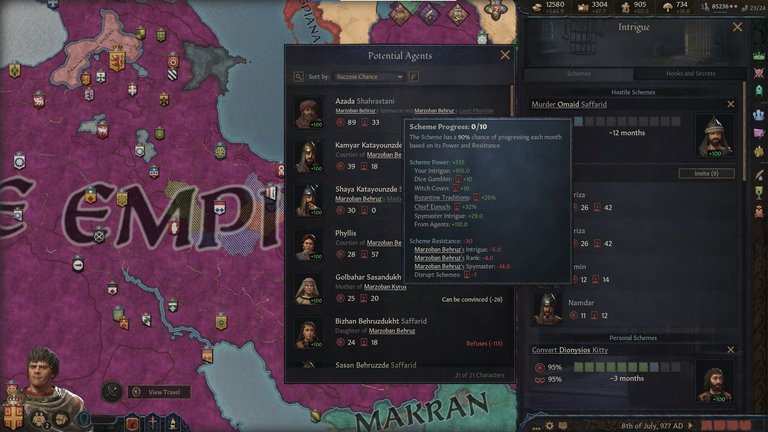
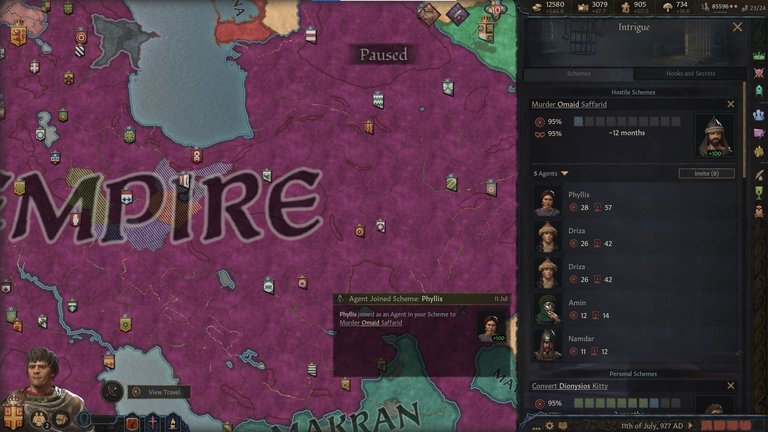
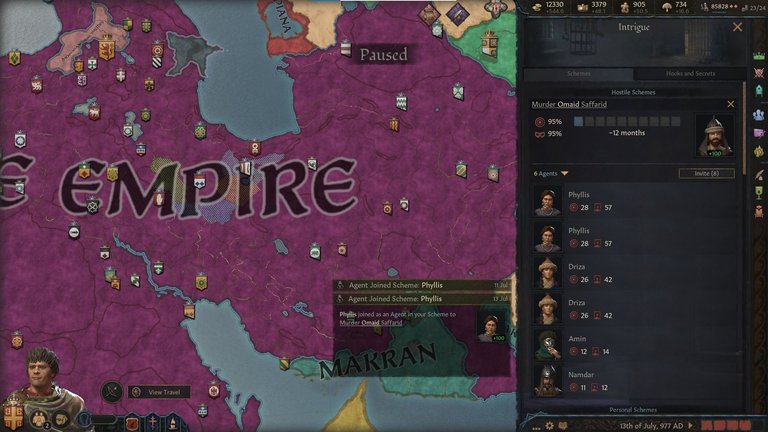
After 10 months of planning and coordination, Operation Honeypot is a success, thanks to the help of our two Honeypot agents.


7. DEBRIEF
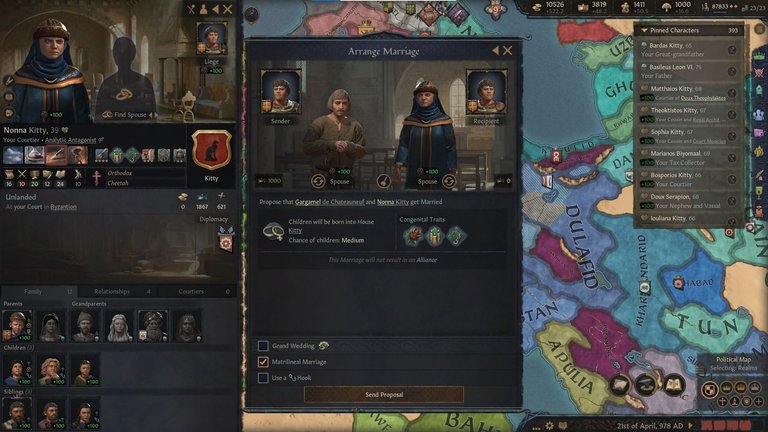
Now that Nonna Kitty is single again, I can arrange a proper matrilineal marriage for her.
In some cases you may want to do several hostile schemes in the same court. For example, you may try to murder several rulers (or their heirs) to clear the line of succession so that your dynasty or house can inherit. If that is the case, then inserting Honeypot agents can be helpful because they can potentially assist with all of your schemes in that location.
Last of all, while I readily use this technique in foreign courts and even with many of my vassals, I would be cautious about using this in the court of an important vassal that I care about, including dynasty members. The last thing you want to do is introduce a Zealous Elusive Shadow that hates everyone into a court that is full of your dynasty members (unless that is who you are trying to eliminate!).
Updated April 15th, 2024: